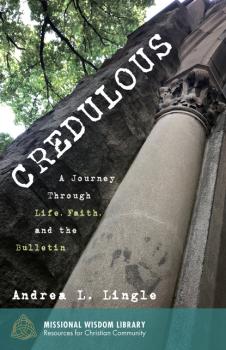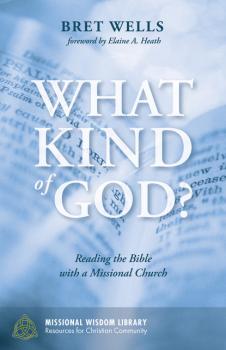ТОП просматриваемых книг сайта:
Религия: прочее
Различные книги в жанре Религия: прочее, доступные для чтения и скачиванияАннотация
Two decades ago, I saw three everywhere. Father, Son, Holy Spirit. Beginning, middle, end. Proton, neutron, electron. Mind, heart, body. Yesterday, today, tomorrow. Mother, father, child. I was settled in three. The triangle is the most stable shape, and my God was entirely stable. Now, I am seeing plus one and it is wrecking me. I am the plus one. You are the plus one. It is the gospel message. The stability of the Trinity has become the rhombus, the square, the diamond, and the trapezoid. And it is beautiful. And now, in this puddle of disorientation, I have found peace in abundance. God is abundant. Life is abundant. Come, cast into the abundant deep.
Информация о книге
Автор произведения Andrea L. Lingle
Жанр Религия: прочее
Серия Missional Wisdom Library: Resources for Christian Community
Аннотация
This book is about giving people hope and faith, comfort and inspiration when a death occurs. It is based on my experiences throughout my forty-year career as a rabbi in helping my congregants deal with the emotions and thoughts that occur when a loved one dies. I have grown to understand, and have taught about, the importance of community when we are mourners, and of the absolute emotional and spiritual power of prayer. The book includes lessons that I have learned personally and professionally, lessons that are relevant to the very real issues brought on by sorrow and regret. My messages not only educate those who read them but also convey a sense of faith and hope that can positively affect our transition from mourning to living our lives. And, they are valid for Jews and non-Jews alike–those who attend services, and those who don't.
Аннотация
By redefining terms and language, the far-left controls discourse and alters Western civilization even to the extreme of exchanging that which was formerly nearly universally condemned for what is now nearly universally celebrated–the almost total desecration of the created order (Rom 1:18-32). And those who refuse to celebrate are threatened with the loss of their business, their home, and life's savings. Virtually everything formally considered right and true, sane and decent are now exchanged for inhuman, indecent, pagan values. Our nation's nearly universal refusal to acknowledge God has resulted in our alienation from God and our lawless insanity. This book is not intended to condemn America but to restore sanity and civility to the greatest nation on earth through a minority of united, faithful, and courageous believers in whose lives the Sermon on the Mount takes narrative form.
Аннотация
¿Alguna vez te has preguntado de los dones de lenguas, profecia o el bautismo del Espiritu Santo? Muchas opiniones y perspectivas varian de estos temas. ¿Son para hoy? ¿Murieron con los apostoles? Este libro estudia estos asuntos con un viaje panoramico a traves de la Biblia en el Antiguo y Nuevo Testamento, sus efectos en la historia de la iglesia y lo que significan para nosotros hoy. Si alguna vez te has preguntado o luchado con este tema, este libro es para ti.
Аннотация
The key to becoming a saint is to actively practice the virtues. How can you practice the virtues if you do not understand the concept of «virtues»? This book is comprised of twelve virtues that will aid you in your quest to become a saint. The three theological virtues (faith, hope, charity) are in Part 1 of this book. Next, you will dive into the four cardinal virtues (prudence, justice, fortitude, temperance). Finally, you will learn about five virtues close to my heart (patience, compassion, perseverance, authenticity, purposefulness). It is my hope that you will find at least one of these virtues tugging at your heart to develop further in your life. Perhaps learning of these virtues will lead you to research other virtues and their meaning to you.
In a concise, easy to follow format, each chapter consists of the following elements pertaining to each virtue: ·Definition ·Scripture passages ·Catechism of the Catholic Church references ·A saint that exhibits the virtue ·Real lives, real stories connecting each virtue to another person ·Reflection tying the saint to the other person as he/she strives for that virtue ·Questions to guide you to reflect on each virtue ·Digging deeper where you can ponder Biblical figures and how they practice each virtue ·Closing prayer As you journey through this book, I pray you grow closer to God. Let us stand together to live a virtuous life, countercultural to what the world offers today.
In a concise, easy to follow format, each chapter consists of the following elements pertaining to each virtue: ·Definition ·Scripture passages ·Catechism of the Catholic Church references ·A saint that exhibits the virtue ·Real lives, real stories connecting each virtue to another person ·Reflection tying the saint to the other person as he/she strives for that virtue ·Questions to guide you to reflect on each virtue ·Digging deeper where you can ponder Biblical figures and how they practice each virtue ·Closing prayer As you journey through this book, I pray you grow closer to God. Let us stand together to live a virtuous life, countercultural to what the world offers today.
Аннотация
Have you ever wondered about the gifts of tongues, prophecy, or the Baptism of the Holy Spirit? So many opinions and points of view vary on these topics. Are they for today? Did they die with the apostles? This book takes a look at these issues with a panoramic journey throughout the Bible in both the Old and New Testaments, their effects in church history, and what that means for us today. If you have ever wondered or struggled with these topics, then this book is for you.
Аннотация
Mean Christianity: Finding Our Way Back to Christ's Likeness explores the Christian faith as an intentional, daily commitment to others–a cathartic and uncomfortable journey that leads travelers to Christ's likeness. The book considers how and why individual Christians and the corporate body of Christ have come to be perceived negatively by so many. It describes the primacy of Christ as the central tenet of Christianity, and offers seven «Jesus» life themes for every Christian. These themes, based on a qualitative study of the canonical gospels, assist readers with the development of a framework for a Christlike life. The book defines Mean Christianity and considers its causes and costs. Readers are confronted with both the possibility of meanness in the faith and in their actions, and encouraged to consider a Christlike life as an alternative to meanness. Finally, readers are introduced to the concepts of forgiveness, grace, and mercy as a part of God's broader plan for reconciliation and fullness in life.
Аннотация
The Gospel of John was long assumed to be the work of an eyewitness, usually identified as John, son of Zebedee. More recently, many have judged it the unhistorical product of a «Johannine community.» Reconsideration by Richard Bauckham has suggested that the author was a Jerusalem disciple who housed the «Last Supper.» This book explores the possibility that he was present at most of the events he described. It contends that John's Gospel reveals the real Jesus and that the Evangelist was one of the most perceptive Christian writers of all time. The Gospel strongly advocates belief that Jesus was uniquely related to God, and hence uniquely authoritative, thus providing an urgent evangelical thrust to this book.
Аннотация
Beatitudes, Not Platitudes shows that the Beatitudes are not overused, well-worn answers to the question, «What would Jesus do?» Rather, they are undervalued and hardly touched claims that transform our destinies. More than spiritual nuggets for personal devotion, practical advice, or propositions to be believed, the Beatitudes in Matthew 5 envision and entail a reorientation of the good life in view of Jesus' kingdom. Jesus' teachings reveal to us that living our best purpose-driven life now involves dying to self and the world system, and dying for our enemies. Ideal for group study, this series of meditations on each of the Beatitudes, followed by cultural reflections and study questions, helps to bridge the gaps between personal devotion and societal revolution, the academic and the practical, the ancient and the contemporary. All of us want to be happy, to be well and blessed, and esteemed with honor. However, we look for happiness, wellness, blessing, and honor in different places and with mixed results. This book helps us reimagine the good life by taking a fresh look at the Beatitudes as citizens of Jesus' ever-new kingdom order.
Аннотация
How does a missional mindset or perspective impact the way we read Scripture? How does the Bible speak to and through a missional disciple? And seriously, what kind of God is God? A missional reading of Scripture is pivotal to helping the church find its way back to its true vocation and to helping newly forming missional communities follow the triune God revealed in Jesus. To the extent that the church is absorbed with itself and its own comfort and agendas, it has forsaken the God revealed in Jesus, whom we claim to follow. The mission of God will lead us to confront the injustices in our society, shed light on the lies we tell ourselves, and name the sickness in our midst. Reading the Bible with (and as) a missional church means we approach the Bible with the assumption that God is actually up to something in this world, that we are all called to play an active role in that something, and that the Bible is the story of that something. What kind of God is God? We invite you to read with us, and see for yourself.
Информация о книге
Автор произведения Bret Wells
Жанр Религия: прочее
Серия Missional Wisdom Library: Resources for Christian Community










